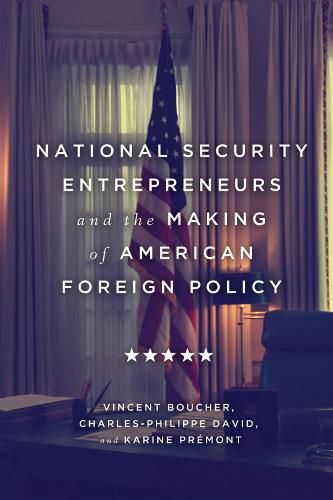Readings Newsletter
Become a Readings Member to make your shopping experience even easier.
Sign in or sign up for free!
You’re not far away from qualifying for FREE standard shipping within Australia
You’ve qualified for FREE standard shipping within Australia
The cart is loading…






This title is printed to order. This book may have been self-published. If so, we cannot guarantee the quality of the content. In the main most books will have gone through the editing process however some may not. We therefore suggest that you be aware of this before ordering this book. If in doubt check either the author or publisher’s details as we are unable to accept any returns unless they are faulty. Please contact us if you have any questions.
Since the advent of the contemporary US national security apparatus in 1947, entrepreneurial public officials have tried to reorient the course of the nation’s foreign policy. Acting inside the National Security Council system, some principals and high-ranking officials have worked tirelessly to generate policy change and innovation on the issues they care about. These entrepreneurs attempt to set the foreign policy agenda, frame policy problems and solutions, and orient the decision-making process to convince the president and other decision makers to choose the course they advocate. In National Security Entrepreneurs and the Making of American Foreign Policy Vincent Boucher, Charles-Philippe David, and Karine Premont develop a new concept to study entrepreneurial behaviour among foreign policy advisers and offer the first comprehensive framework of analysis to answer this crucial question: why do some entrepreneurs succeed in guaranteeing the adoption of novel policies while others fail? They explore case studies of attempts to reorient US foreign policy waged by National Security Council entrepreneurs, examining the key factors enabling success and the main forces preventing the adoption of a preferred option: the entrepreneur’s profile, presidential leadership, major players involved in the policy formulation and decision-making processes, the national political context, and the presence or absence of significant opportunities. By carefully analyzing significant diplomatic and military decisions of the Johnson, Nixon, Reagan, and Clinton administrations, and offering a preliminary account of contemporary national security entrepreneurship under presidents George W. Bush, Barack Obama, and Donald Trump, this book makes the case for an agent-based explanation of foreign policy change and continuity.
$9.00 standard shipping within Australia
FREE standard shipping within Australia for orders over $100.00
Express & International shipping calculated at checkout
This title is printed to order. This book may have been self-published. If so, we cannot guarantee the quality of the content. In the main most books will have gone through the editing process however some may not. We therefore suggest that you be aware of this before ordering this book. If in doubt check either the author or publisher’s details as we are unable to accept any returns unless they are faulty. Please contact us if you have any questions.
Since the advent of the contemporary US national security apparatus in 1947, entrepreneurial public officials have tried to reorient the course of the nation’s foreign policy. Acting inside the National Security Council system, some principals and high-ranking officials have worked tirelessly to generate policy change and innovation on the issues they care about. These entrepreneurs attempt to set the foreign policy agenda, frame policy problems and solutions, and orient the decision-making process to convince the president and other decision makers to choose the course they advocate. In National Security Entrepreneurs and the Making of American Foreign Policy Vincent Boucher, Charles-Philippe David, and Karine Premont develop a new concept to study entrepreneurial behaviour among foreign policy advisers and offer the first comprehensive framework of analysis to answer this crucial question: why do some entrepreneurs succeed in guaranteeing the adoption of novel policies while others fail? They explore case studies of attempts to reorient US foreign policy waged by National Security Council entrepreneurs, examining the key factors enabling success and the main forces preventing the adoption of a preferred option: the entrepreneur’s profile, presidential leadership, major players involved in the policy formulation and decision-making processes, the national political context, and the presence or absence of significant opportunities. By carefully analyzing significant diplomatic and military decisions of the Johnson, Nixon, Reagan, and Clinton administrations, and offering a preliminary account of contemporary national security entrepreneurship under presidents George W. Bush, Barack Obama, and Donald Trump, this book makes the case for an agent-based explanation of foreign policy change and continuity.